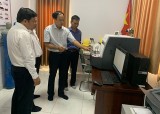Supporting industry policies yet to deliver desired outcomes
A large number of policies to bolster the development of the domestic supporting industry have been issued, but they have still fallen short of expectations of local firms.

Many global supporting industry production chains have been shaped in the past time, but few Vietnamese firms fully acknowledged potential and business opportunities of the sector. (Illustrative photo: VOV)
There still remains huge room to develop the domestic supporting industry (SI) as the majority of SI firms operate on small and medium scale. These enterprises reportedly confront a wide range of difficulties regarding market access, technology development, human resources, and capital mobilization.
Besides, little importance has been attached to policies aimed at boosting the in-depth research and development of SI. Local enterprises have paid more attention to the domestic SI market than the global one.
Nguyen Ngoc Son, chairman of Giang Son electronic component manufacturing company, said that capital mobilization has become the biggest challenge his firm faces in expanding its investment and production.
"Although the Government has issued preferential policies and mechanisms dedicated to leveraging the access to bank credit, many SI firms still fail to enjoy the incentives as a wide range of inadequacies persist with lending procedures."
Nguyen Duc Cuong, general director of the Hikari Vietnam P&T Co., Ltd, said that how to raise capital is also a thorny issue for the firm, although it is necessary to enlarge production bases with the overall aim of meeting orders and technical standards as required by overseas partners.
Hikari Vietnam P&T has hesitated to expand its production by making investments in the South Hanoi Supporting Industry Park as costs for land leasing and site clearance remain high while the total investment in Hanoi is five times higher that of neighbouring provinces, Cuong revealed.
He suggested that the Government and Hanoi authorities seek ways of handling these issues and put forward preferential mechanisms specifically for SI firms in the near future.
Many global SI production chains have been shaped in the past time, but few Vietnamese companies fully acknowledged the potential and business opportunities of the SI sector.
Nguyen Hoang, vice chairman of the Vietnam Association for Supporting Industries, attributed the underdeveloped pace of the SI sector partially to the State as many pragmatic solutions have yet to be adjusted in a prompt manner, thereby hampering the creation of a favourable business climate and opportunities for SI enterprises.
Up to 99 per cent of the nationwide SI firms operate on medium, small, and even micro scales. If they do not receive any support to foster growth and are unable to build up a firm foundation on their growth, they could be put at a considerable disadvantage when coming into competition with foreign rivals during the implementation of the free trade agreements (FTAs) which Vietnam has signed.
An array of decisions and decrees have been issued by the Government to accelerate the domestic SI development, but the implementation of such policies and their impacts have not been fully reviewed, Hoang claimed.
The Government should continue to perfect and submit the draft Law on Supporting Industry to the National Assembly for consideration and approval, he suggested, adding that the Government should quickly set up a national steering committee for IS development and IS in high-tech fields.
Both authorities and businesses should define Industry 4.0 as a key element that would help further develop the domestic SI.
In order to realize the goal, companies should be permitted to access official development assistance (ODA) which could be used to purchase and install high-tech equipment and machinery, Hoang said. He elaborated that detailed regulations should be clarified and applied to each economic zone, especially those relating to the infrastructure investment of specialized industrial parks which will be home to SI item manufacturers.
To achieve breakthroughs in the SI development, he recommended that the Government encourages foreign-invested firms operating in Vietnam to increase their localization rate each year by offering additional orders to domestic suppliers. In turn, such foreign companies would be provided with respective tax and policy incentives.
The State absolutely plays an essential role in boosting the development of the SI sector, he said, urging for increased efforts by local authorities and state management agencies to support, guide, and protect Vietnamese SI firms that operate in line with Vietnam’s legal regulations and the FTAs to which Vietnam is a signatory.
VOV
 Digital-based image and brand construction
Digital-based image and brand construction
 Support provided to facilitate social housing investment
Support provided to facilitate social housing investment
 Exports in year-end months see positive signals
Exports in year-end months see positive signals
 Thuan An city urban space to be more glamourous
Thuan An city urban space to be more glamourous
 Create conditions for businesses to invest in social housing
Create conditions for businesses to invest in social housing
 Halal market potentials open up novel opportunities to enterprises
Halal market potentials open up novel opportunities to enterprises
 Bac Tan Uyen district accelerates completion of annual targets and plans
Bac Tan Uyen district accelerates completion of annual targets and plans
 10th industry and trade conference of southern localities held
10th industry and trade conference of southern localities held
 SPC for manufacturing enterprises promoted
SPC for manufacturing enterprises promoted
 Province realizes the semiconductor industry development strategy
Province realizes the semiconductor industry development strategy







